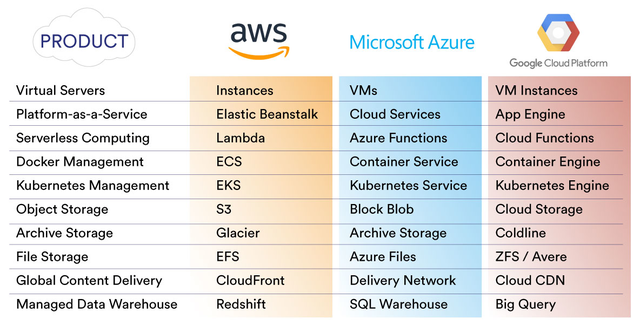Today’s data-driven world has made cloud services into digital demigods.
As technological advancements accelerate, cloud computing’s importance grows. Cloud Computing has evolved over time. In the digital age, opting for a cloud platform is more of a decision than a question. Cloud computing is a way to deliver databases, storage, computing power, and applications on-demand. Cloud services platforms enable internet users to access this service. They allow users to upload and store files remotely. After that, data can be accessed remotely at any time. Generally speaking, these services are pay-as-you-go. The reason cloud computing is so popular is that the data gets stored in a central location and is accessible from anywhere.
By 2022, Gartner estimates the global public cloud services market will grow to $331.2B, which is 12.6% compound annual growth.
As the Cloud Computing market floods with numerous cloud providers, Amazon Web Services, Microsoft Azure, and Google Cloud Platform hold a firm position as the top three. Where do you begin? In your opinion, which cloud does Google Cloud, AWS, or Azure have the edge? That’s why you can find all the answers to these questions in this blog.
Let’s spill the beans!
What is the AWS Cloud Platform?
“Amazon Web Services”, commonly known as “AWS”, is a cloud computing platform for companies. The service is widely adopted around the world. AWS is the oldest player in the public cloud services market. The most important components of a successful enterprise are the application services, computing power, and database infrastructure. A multitude of cloud services is available, including SaaS, PaaS, and IaaS.
Therefore, AWS has more high-profile and well-known customers like Netflix, Airbnb, Unilever, BMW, Samsung, MI, Zynga, etc.
What Is Azure?
Azure is a powerful, integrated cloud platform for companies that already use Windows-based applications. The Microsoft Azure platform provides companies of all sizes with the ability to manage site-to-site replication and data restoration.
There are several data centers in several regions of this cloud that provide zone redundant storage (ZRS). There is a variety of networking options within Azure and the ability to connect different virtual networks across multiple sites. Microsoft Azure Machine Learning Studio enables developers to write, test, and deploy algorithms.
As time passes, Azure also gains more high-profile clients. Azure now has almost 80 percent of Fortune 500 companies as clients. There are several major companies that use it, including Johnson Controls, Polycom, Fujifilm, HP, Honeywell, Apple, etc.
What Is Google Cloud Platform?
There is no one better than Google when it comes to providing cloud solutions. GCP is a component of the Google Cloud Platform (GCP). AWS and Azure have only recently emerged as strong competitors to Google, which was launched in 2008 as an offshoot of Gmail. GCP also offers IaaS and PaaS, as well as a serverless platform that offers computing, storage, databases, multiple networking options, and IoT and database management.
The Google Cloud, on the other hand, shares the same infrastructure as that of Google Search and YouTube, and, as a result, many high-end companies have taken a liking to the service. The top clients of Google Cloud include HSBC, PayPal, 20th Century Fox, Bloomberg, Dominos, and others.
Shown down: AWS vs Azure vs Google
Wrapping
A battle for cloud supremacy is raging among the Big Three. Even though a number of other players have entered into the cloud computing space, they are still far from cornering significant shares of the market.
The three cloud platforms AWS, Azure, and GCP each offer unique features and benefits and can be tailored to meet specific organizational needs.
Whether AWS will maintain its leading position or if others will catch up in the near future remains to be seen.
